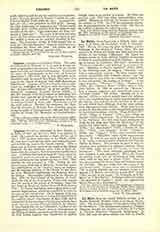

La Harpe , JEAN-FRANCOIS, a French critic and poet, b. at Paris, November 20, 1739; d. February, 1803. He was ten years old when his father, a Swiss nobleman in the service of France, died. He was cared for by Sisters of Charity and then sent as a free scholar to the College d’Harcourt. He began his literary career by some satirical couplets, on account of which he was imprisoned at Fort-l’Eveque. At the aagge of twenty he published “Heroides”, preceded by “Essai sur l’heroide”, and followed by a second volume, “Heroides et Poesies fugitives” (Paris, 1762). In the following year, his tragedy “Warwick” met with a tremendous success. He then became intimately acquainted with Voltaire, whose “son” he professed to be, and whom he imitated so closely that he was nicknamed “the monkey of Voltaire”. A few other tragedies—”Timoleon” (1764), “Pharamond” (1765), and “Gustave Wasa” (1766)—were a complete failure. In 1768 he entered the “Mercure” then a famous magazine, and contributed some remarkable articles. His drama, “Melanie ou la religeuse” (1770), a violent attack upon the religious vows, the representation of which was forbidden by the censors, was enthusiastically received by the public and widely read, although it is the most tedious book that has ever been written. Three years in succession he won the prize in the competition instituted by the French Academy, with his “Eloge de Henri IV” (1770), “Eloge de Fenelon” (1771), and “Eloge de Racine” (1772) respectively. In 1776 he was elected to the Academy. He then once more attempted to work for the stage and force the admiration of the public, but failed anew. His tragedies, “Menzicoff” (1776), “Les Barmecides” (1778), “Jeanne de Naples” (1781), “Les Brames” (1783), “Coriolan” (1784), and “Virginie” (1786), were received worse than coolly. “Philoctete” alone (1783) won some applause. In 1787 he was made professor of literature in the Lycee, a school recently established in Paris by Pilatre du Rozier. The lectures he gave in that institution were published in eighteen volumes (Paris, 1799-1805) under the title of “Lycee, ou Cours de litterature”. This work, although containing excellent chapters, is now antiquated. When the French Revolution broke out, he welcomed it with enthusiasm until he was sent to prison (1794). Once set free, he renounced his former ideas and became a zealous Catholic. His last works bear the stamp of his new-found faith. Among them may be mentioned: “De la guerre declaree par nos derniers tyrans a la Raison, a la Morale, aux Lettres et aux Arts” (Paris, 1796); an epic in six books, “Le Triomphe de la Religion, ou le Roi Martyr“, published after his death; “La prophetie de Cazotte”, which was regarded by Sainte-Beuve as a masterpiece.
LOUIS N. DELAMARRE

